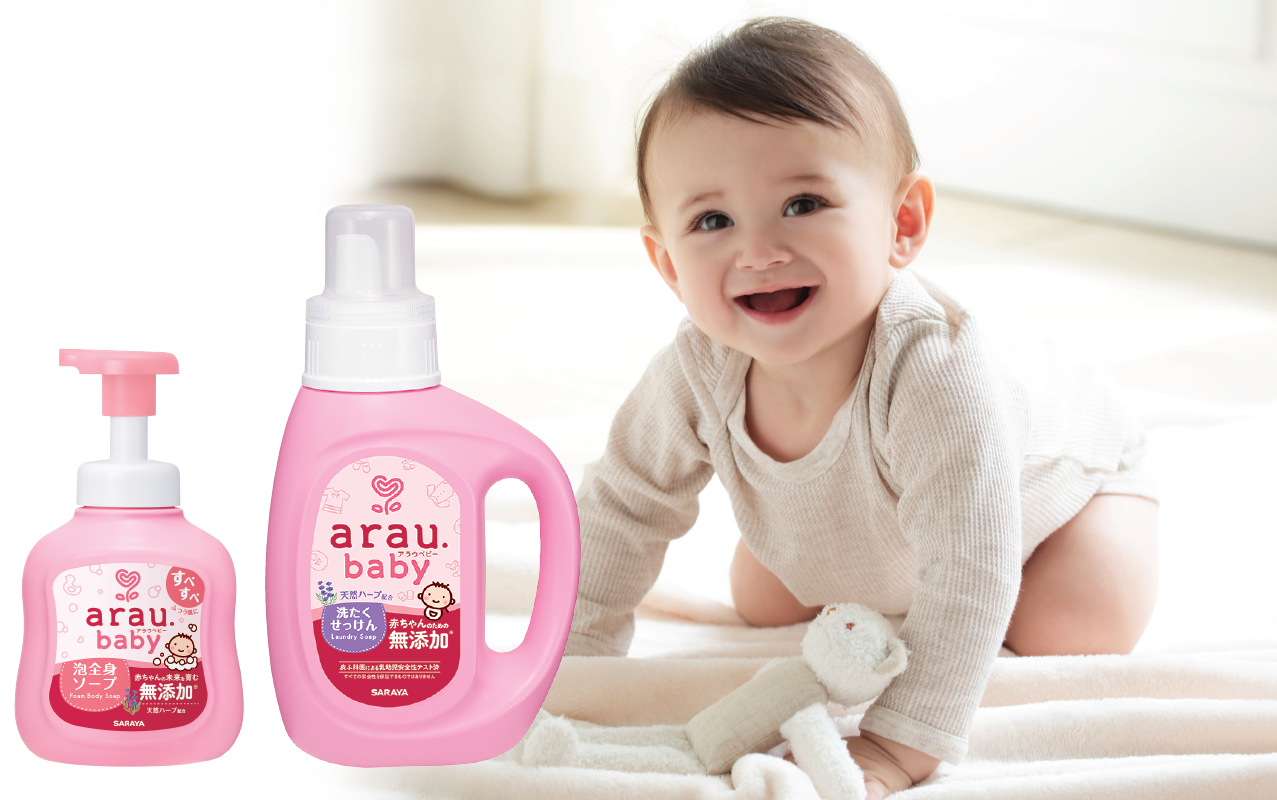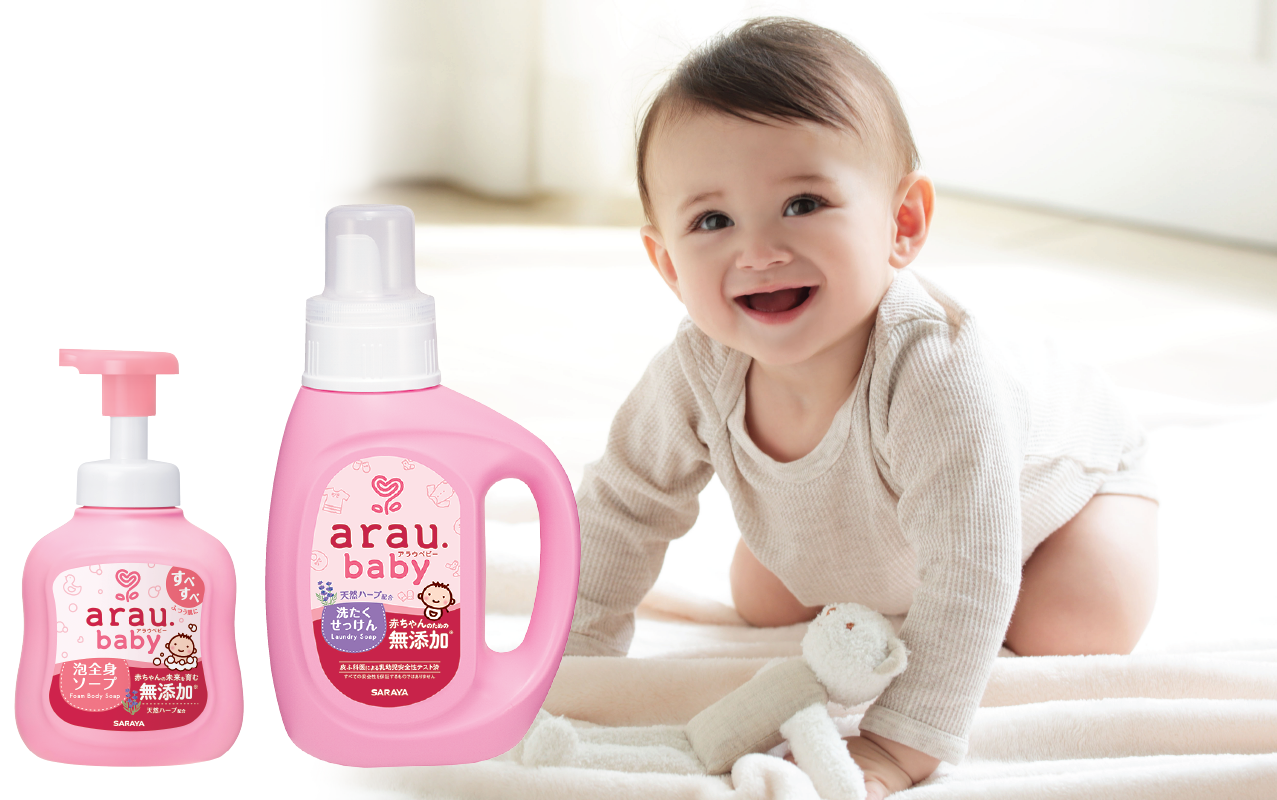

FAQ
Welcome to Frequently Asked Questions.
Find answers to commonly asked questions about arau.baby.
The difference is that soaps are manufactured from natural materials and form scum when used in hard water while detergents are manufactured from synthetic materials and do not form scum in hard water. Soaps are made from fat and lye while detergents are mainly made from petroleum products and have many substances added to them. Both soaps and detergents mix with water to remove dirt from the surface.
arau.baby product series are all soap based made in kettles to ensure a safe and environmentally-friendly method of cleaning. arau.baby is made by taking heated 100% refined palm oil and potassium to make a soap base after which natural herbs and essential oils are added. This process takes over 100 hours to complete, but yields a fine soap with natural moisturising glycerine.
Soap is mildly alkaline with a pH between 10 and 11. Since or skin is mildly acidic, many cosmetics are formulated to be mildly acidic as well to maintain the skin’s pH. However, cleansing skin products made to be rinsed off immediately are slightly alkaline to remove dirt, old skin cells and makeup. Because the skin can be sensitive, it is important to use an effective cleanser matching our skin type which gently removes dirt and oil.
Soap is a natural type of surfactant. A surfactant is a compound that lowers the surface tension of liquids, which allows dirt, oil and other stains to easily be removed from surfaces and materials. For example, adding a surfactant to mixture of water and oil will allow the two to mix together, making the oil flow away with water. This is how dishes can be cleaned with a detergent, which contains surfactants. Soap has the same ability to remove dirt and grease as detergents, however, arau.baby soap is developed from natural, carefully selected ingredients, making it safe to use on many different materials and skin types. arau.baby soap is just as effective as detergent with greater foaming and a higher rinsing capability.
Even though arau.baby Laundry Soap contains zero synthetic fabric softeners, it still softens the fabric as it cleans. This is because of the natural characteristics of the laundry soap which contains natural herbal extracts and essential oils. So you won’t need to use any artificial laundry softeners when you use arau.baby Laundry Soap.
In order to make your fabrics appear cleaner and brighter, many companies use what are known as “optical brighteners” in their detergent formulas. Optical brighteners, also called brightening agents, fluorescent bleaches, and optical whiteners. Some examples of optical brighteners are coumarins, naphthotriazolylstilbenes, benzoxazolyl, benzimidazoyl, aphthylimide, and diaminostilbene disulfonates.
These ingredients are often shown on the labels of laundry detergents, but often can be omitted. These chemicals are designed to help fabrics appear to be cleaner, brightening colours and lessening the natural yellowing of fabric over time. Optical brighteners are not effective unless they remain on the fabric after washing. Clothes washed in detergents containing these agents will leave a chemical residue on the fabric. In terms of human health, exposure to optical brighteners, which remain on laundry by design, can cause eye irritations and skin reactions in sensitive individuals. Many times, skin rashes are commonly blamed on fragrance and dyes are actually caused by optical brighteners, so these detergents should not be used by individuals with sensitive skin.
Our arau.baby Laundry Soap contains zero whiteners or fluorescents as these additives can cause irritation or allergy to the baby’s sensitive skin, therefore while it still thoroughly cleanses all the dirt and oil, by the power of natural ingredients, the colour of your clothes may return to their original fabric colour. Please also note that not only soap, but any type of laundry cleaner may cause yellowing if oil from the skin and sweat is not properly rinsed from clothes.
Soap acts differently in the water depending on the amount of hard water components such as calcium and magnesium ions. Because arau.baby Laundry Soap is a natural soap, excessive amounts of these ions may cause residue to remain.
Most people assume that today’s fragrances are made from flowers and fruits, but artificially fragranced products provide a constant source of fragrance chemicals that are absorbed by your skin and inhaled as vapours. Did you know that 95% of the chemicals in artificial fragrances are synthetic compounds derived from petroleum? Benzene, toluene, xylenes, and methanol are some of the common petrochemicals used in these aromatic concoctions. One type of hidden hazard in products that contain synthetic fragrance is allergens, which can damage the immune system and permanently sensitise an individual to the ingredient.
This sensitivity causes allergic reactions or asthma attacks upon exposure. Other hazardous chemicals in fragrances include phthalates, neurotoxins and synthetic musks, which are suspected hormone disruptors. Baby skin is much thinner than adult skin and so absorbs much of whatever is put on their skin. Parents should consider whether or not they should apply any synthetic fragrance that is derived from petroleum on their baby’s sensitive skin. Also, why would anyone want to mask the wonderful natural smell of a baby by applying synthetic fragrances to a baby’s skin?
